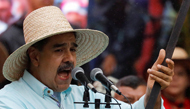[한글 번역] Economic Turmoil Upends Gulf States

The Kuwait stock exchange, where trading was halted on a troubled bank.
By MICHAEL SLACKMANCAIRO - For many of the financially strapped nations of the Middle East, the oil-rich countries of the Persian Gulf have served for years as an economic lifeline, providing jobs for their citizens, who in turn sent millions of dollars back home; tourists, who filled their hotels when Westerners were reluctant to visit; direct investment; and the kind of checkbook diplomacy that has helped stabilize an often volatile region.
Suddenly, that lifeline appears frayed, dangerously so for countries like Egypt and Jordan, as the energy-rich nations find themselves pulled into the global financial crisis and undermined by dropping oil prices. Across the Persian Gulf, stock markets are down, causing panic among investors. Even in the boomtown of Dubai, United Arab Emirates, the oncemighty real estate market has cooled as access to credit has tightened.
Governments across the region have intervened.
The United Arab Emirates injected $32 billion into its banking system and guaranteed bank deposits. Saudi Arabia has offered billions of dollars to make loans available to its citizens. And Kuwait, which had already cut its benchmark rate, recently moved to prop up its second largest bank.
But the era of sky-high oil prices, while now a memory, left most of the region’s capitals with enough cash reserves to cushion the blow, economists and financial experts in the region said.
And as long as oil sells for more than $55 a barrel, most of the governments will take in more than they have allocated in their budgets, regional analysts said.
“We are not calling for a recession in the gulf,’’ said Marios Maratheftis, regional head of research for Standard Chartered Bank in Dubai. “We are looking at a slowdown.
But a slowdown in the Persian Gulf might feel like a crash landing in places like Egypt, Jordan and Syria, where gulf money has helped prop up strained economies.
“When there is growth in the gulf, there will be growth in the whole Arab world,” said Rashad Abdou, a professor of economics and international finance at Cairo University. “There would be more tourism, more money in the stock market, more investments.
And the opposite is true. With a shrinking or recession, they will not come for tourism, they will not put their money in the stock market, they will not invest and they will not be able to hire Egyptian workers.”
Egypt receives about half of its $6 billion in annual remittances from more than two million citizens living and working in the Persian Gulf area, while about 60 percent of its tourists come from that region, Egyptian economists estimated.
Syria has benefited from gulf investments in large real estate projects, helping offset some of the isolation imposed by United States sanctions.
Jordan receives about $2 billion annually in remittances from workers in the Persian Gulf and takes in about $500 million in financial aid from Saudi Arabia alone.
“I expect investments from the gulf to slow down or stop because they have to deal with their own problems before they invest in other countries,” said Nabil Samman, an economist who runs the Damascus- based Center for Research and Documentation. “Syria will be affected in terms of the Syrian people who send money from the gulf. There are close to a million Syrians in the gulf area.”
Dubai had to turn to the government of the United Arab Emirates for an injection of capital to keep its banks afloat.
Optimists are hoping that the cooling of Dubai’s overheated real estate market will ultimately have a positive effect on the emirate, though they recognized it would not be without pain.
“Every single person who has $100,000, which is to say, 20,000 dinars, is really involved in this,” Suleiman al-Mutawa, a former planning minister in Kuwait, said of those invested in stocks. “It adds up to family budgets, to family expenditures, to vacations, hence people are upset.”
경제 혼란이 걸프 나라들에 영향을 끼치다
카이로-페르시안 만의 석유-부유국들은 중동지방에 경제적으로 타격을 입은 많은 중동 지역 나라들을 위해 취업 기회를 제공하는 등 경제적 생명줄로서 도움을 줘왔다; 즉 조국에 수백만 달러를 송금하는 다른 나라 국민들에게 취업기회를 제공함으로써; 또한 서양인들은 방문하기 꺼려하는 호텔을 가득 채워주는 여행객들을 제공함으로서; 또한 직접적인 투자를 통해; 또한 자주 증발하기 쉬운 지역을 안정화시키는데 도움을 줘 온 친절한 ‘체크북’ 외교를 통해서다.
연료-부유국들이 세계적인 경제위기에 끌려들어가 기름 값을 떨어뜨림으로 자신을 망치는 모습을 발견하면서 갑자기 이같은 생명줄이 닳은 것처럼 보이는데 이는 이집트나 요르단과 같은 나라들이 위험할 정도다. 페르시안 만 전체적으로 주식시장이 침체돼 투자자들 가운데 공포감이 조성되고 있다. 두바이의 신흥도시인 아랍에미리트 연방조차도 신용 이용이 엄격화되면서 한때 강력했던 부동산 시장이 침체돼 왔다.
이 지역의 정부들이 끼어들었다.
아랍에미리트 연방은 자체 은행 시스템에 320억달러를 투자해 은행 예금을 보장해 왔다. 사우디아라비아는 국민들에게 은행 대출이 가능하도록 수백만달러를 제공해 왔다. 또한 기준율을 이미 내린 쿠웨이트는 최근 이 나라의 두 번째 대형은행을 지지하기 위해 움직였다.
그러나 하늘 높은 줄 모르고 치솟던 기름 값 시절에, 지금은 추억이 됐지만, 이 지역의 대부분의 수도들은 경제 붕괴를 견딜 만큼의 여유 현금을 축적했다고 이 지역의 경제와 재정전문가들이 말했다.
그리고 기름이 배럴당 55달러 이상만 팔리면 대부분의 정부는 그들이 할당한 예산보다 많이 돈을 벌게 돼 있다고 지역 분석가들이 말했다.
“우리는 걸프지역의 경기 침체를 선언하는 것이 아닙니다” 마리오스 두바이 스탠더드 차터 은행의 지역 연구 본부의 마라테프티스가 말했다. “우리는 경기둔화를 보고 있어요”
그러나 페르시안 만의 경기둔화는 걸프 만의 돈이 불안한 경제를 지탱하도록 도와줬던 이집트나 요르단, 혹은 시리아 같은 곳의 경우 경기 폭락이 온 것으로 느낄 것이다.
“걸프 만에 경제성장이 있는 곳에는 아랍 세계 전체의 성장이 있게 됩니다” 카이로 대학의 경제학과 국제 재정 교수인 라샤드 압도우가 말했다.
“여행객이 늘어나고, 주식시장에 더 돈이 많아지고, 투자가 늘게 됩니다. 그리고 정 반대 또한 사실입니다. 경기가 긴축되거나 침체되면, 여행객이 오지 않고, 주식시장에 돈을 투자하지도 않을 것이며, 투자를 하지 않고 이집트 노동자를 고용할 수도 없을 것입니다”
이집트는 60억달러에 달하는 연 송금액 중 절반을 페르시안 만 지역에서 거주하고 일하는 200만명의 노동자들로부터 받는데 이 지역 출신의 여행객이 이집트 여행객의 60%를 차지하는 것으로 이집트 경제학자들은 측정했다.
시리아는 미국의 재제에 의한 격리를 상쇄하도록 도왔던 거대한 부동산 프로젝트에 투자한 걸프만의 투자가들에 의해 혜택을 받아왔다.
요르단은 페르시안 만의 노동자들로부터 매해 약 20만달러를 송금 받고 있으며, 사우디아라비아로부터만 5억달러의 재정보조를 받는다.
“나는 걸프지역의 투자가들이 투자를 점점 줄이거나 혹은 중단할 것으로 생각합니다. 왜냐하면 다른 나라에 투자하기 전 자신들의 문제부터 해결해야 되기 때문입니다” 다마스커스 소재 연구와 외교센터를 운영하는 경제학자인 나빌 사만이 말했다.
“시리아는 걸프 지역에서 일하며 돈을 송금해 온 사람들에 관해 영향을 받게 될 겁니다. 걸프 지역에서 수백만 명 가까운 시리아 국민이 있습니다”
두바이는 그의 은행이 빚지지 않게 하기 위해 원금의 투자를 요구하러 아랍에미리트 연방 정부로 향해야 했다.
낙관론자들은 두바이의 과열 된 부동산 경기의 열기가 가시면 궁극적으로 에미리트에 긍정적인 영향을 끼치게 될 것이라고 희망하고 있다. 그러나 그들은 그것이 고통 없이는 이뤄지지 않을 것이라는 것도 인지하고 있다.
“10만달러, 즉 2만디나르 이상을 가진 모든 개인은 모두 실제적으로 관련 돼 있다” 쿠웨이트의 이전 계획 장관인 술래이먼 알-무타와는 주식시장에 투자한 사람들에 대해 말했다. “결국 가족 예산, 가정 지출 혹은 가족 휴가를 의미합니다. 따라서 사람들이 화가 나겠지요”
<마이클 슬랙맨 기자>
<어휘해설>
▲volatile: 증발하기 쉬운
▲checkbook diplomacy: 수표장 외교, 서로간 경제보조, 투자 등을 허락하는 외교
▲benchmark rate: 기준율
▲recession: 경기 침체
▲remittances: 송금액
▲offset: 상쇄하다
▲keep afloat: 빚지지 않고 있다,
▲add up to: 결국 ~이 되다.
스마터리빙
more [ 건강]
[ 건강]이제 혈관 건강도 챙기자!
[현대해운]우리 눈에 보이지 않기 때문에 혈관 건강을 챙기는 것은 결코 쉽지 않은데요. 여러분은 혈관 건강을 유지하기 위해 어떤 노력을 하시나요?
 [ 건강]
[ 건강]내 몸이 건강해지는 과일궁합
 [ 라이프]
[ 라이프]벌레야 물럿거라! 천연 해충제 만들기
 [ 건강]
[ 건강]혈압 낮추는데 좋은 식품
[현대해운]혈관 건강은 주로 노화가 진행되면서 지켜야 할 문제라고 인식되어 왔습니다. 최근 생활 패턴과 식생활의 변화로 혈관의 노화 진행이 빨라지고
사람·사람들
more많이 본 기사
- 굽히지 않는 젤렌스키…트럼프에 역제안 카드로 레드라인 저지
- TV 나와 암투병 근황 공개한 찰스 英국왕… “조기검진 중요해요”
- 국힘·개혁신당 “통일교 특검 수용하라”…與 “정치공세·물타기”
- ‘고가 논란’ 북중미 월드컵 티켓, 판매 첫날 500만건 신청
- 선교사 아들 가나대사로 금의환향… “한국·가나는 두 어머니”
- 한국도 참여한 美주도 AI 동맹 “비시장적 관행에 공동 대응”
- 변요한♥티파니, 결혼 전제 열애 인정
- 송지효 “’런닝맨’ 출연 중 8년 ♥장기 연애했다” 폭탄 고백..멤버 모두 ‘충격’
- 통일교 특검 대신 “내란 2차 특검”… 민주당 ‘철벽 방어’
- “보안사고 반복 땐 과징금 폭탄”… 해킹과 전면전 선포한 과기부
- 종묘 일대 세계유산지구로 세운4구역 개발 영향 줄까
- 한화, 호주 방산업체 최대주주 된다
- 초강경 추방 드라이브… 한인사회 불안… 5
- 제미나이 추격 오픈AI 새 모델 GPT-5.2 조기 공개
- 주한미군사령관 “전작권 전환, 시기보다 조건 봐야”
- 신혼부부 ‘역대 최저’ 24%는 3억 이상 대출
- “’삐빅’ 비트코인으로 결제할게요”…맥도날드·편의점서도 쓴다는 ‘이곳’, 어디?
- “한국, 재래식 방위주도” 한미 핵협의그룹 첫 명시
- AI공급망 동맹 ‘팍스 실리카’ 8개국 참여
- 미일 ‘팍스 실리카’ 협력 문서 서명
- “귀금속 역사상 가장 극적인 재평가”…올해는 銀이 金 앞섰다 [공준호의 탈월급 생존법]
- “헉, AI가 만든 사진일 줄”…발등에 ‘귀’ 달고 다닌 30대 中 여성, 도대체 왜?
- 민주, 트럼프와 여성들 함께 찍힌 ‘엡스타인 사진’ 공개…엡스타인 저택서 확보한 19장에 빌 클린턴·빌 게이츠 등 유명 인사
- 19개주, 트럼프 전문직 비자 ‘10만불 수수료’에 소송
- ‘나혼산’ 박나래, 흔적도 없이 하차… 1
- 에어프레미아, 워싱턴 DC 신규 취항
- 노화의 신호, 흰머리는 왜 생기나… … 2
- 트럼프, 중남미 마약카르텔 공습 확대의지… “지상서도 시작한다”
- “엔비디아, 中수요 반영 H200 증산”…일각선 “中, 수입거부할듯”
- “산타 분장하고 아이들과 만났는데”…교사 출신 60대 남성, 성범죄 혐의에 美 ‘발칵’
- “20분이면 샤워·건조까지 풀코스로”…상상 속 ‘인간 세탁기’ 드디어 첫 가동, 가격 보니
- “말이 참 기십니다”…李대통령, ‘尹… 1
- “멍청한 이민국” 트럼프 비판에… 미, 비자 개선 속도전
- 워싱턴주 홍수로 수만명 대피…주지사 “유례없는 상황 직면”
- 한인 업소들, 이번 주말 ‘할인 대전’ 돌입
- 젤렌스키 측근 협상가가 FBI국장을 왜?…비밀회동 목적 의문
- “머스크의 X, 3분기 매출 7억 달러대…순손실 5억 달러대”
- 뉴욕증시, 브로드컴 비관론에 AI 테마 ‘와르르’…나스닥 1.7%↓ 마감
- [송년행사 화보] “친구야 반갑다… 선배님들 모두 건강하세요”
- ‘양육비 미지급’ 김동성 “내가 月700만원? 통장 압류된 신용불량자”
- 미네소타 보조금 사기, 안보 문제로 비화…월즈 ‘곤혹’
- 우크라 “러 점령 쿠피안스크 일부 탈환”…젤렌스키 방문
- 김지민 “유부남과 불륜, 날 알리바이로 이용”..친구와 손절한 사연 [이호선의 사이다]
- 김하성-ATL, 이대로 헤어지나→윈터미팅서만 무려 1005억 지출해버렸다
- 월마트도 나스닥 이전… 기술기업 변신
- 쿠팡 美소송 신청자, 나흘 만에 2000명 이상 증가… “연내 소장 제출”
- 피겨 선수에서 생물학자·서예가로⋯ 특별한 인생여정
- FDA, 우울증 치료 ‘뇌 자극’ 가정용 헤드셋 기기 첫 승인
- 美 레전드 깜짝 전망 “한국, 북중미 월드컵 A조 1위로 32강”
- 소셜연금 NY 2,018달러·NJ 2,190달러
1/5지식톡

-
 테슬라 자동차 시트커버 장착
0
테슬라 자동차 시트커버 장착
0테슬라 시트커버, 사놓고 아직 못 씌우셨죠?장착이 생각보다 쉽지 않습니다.20년 경력 전문가에게 맡기세요 — 깔끔하고 딱 맞게 장착해드립니다!장착비용:앞좌석: $40뒷좌석: $60앞·뒷좌석 …
-
 식당용 부탄가스
0
식당용 부탄가스
0식당용 부탄가스 홀세일 합니다 로스앤젤레스 다운타운 픽업 가능 안녕 하세요?강아지 & 고양이 모든 애완동물 / 반려동물 식품 & 모든 애완동물/반려동물 관련 제품들 전문적으로 홀세일/취급하는 회사 입니다 100% …
-
 ACSL 국제 컴퓨터 과학 대회, …
0
ACSL 국제 컴퓨터 과학 대회, …
0웹사이트 : www.eduspot.co.kr 카카오톡 상담하기 : https://pf.kakao.com/_BEQWxb블로그 : https://blog.naver.com/eduspotmain안녕하세요, 에듀스팟입니다…
-
 바디프렌드 안마의자 창고 리퍼브 세…
0
바디프렌드 안마의자 창고 리퍼브 세…
0거의 새제품급 리퍼브 안마의자 대방출 한다고 합니다!8월 23일(토)…24일(일) 단 이틀!특가 판매가Famille: $500 ~ $1,000Falcon: $1,500 ~ $2,500픽업 & 배송직접 픽업 가능LA…
-
 바디프렌드 안마의자 창고 리퍼브 세…
0
바디프렌드 안마의자 창고 리퍼브 세…
0거의 새제품급 리퍼브 안마의자 대방출 한다고 합니다!8월 23일(토)…24일(일) 단 이틀!특가 판매가Famille: $500 ~ $1,000Falcon: $1,500 ~ $2,500픽업 & 배송직접 픽업 가능LA…
케이타운 1번가
오피니언

22기 LA평통 출범에 거는 기대

연말 시즌 사기·범죄 경계해야
 메건 매카들 워싱턴포스트 칼럼니스트
메건 매카들 워싱턴포스트 칼럼니스트 [메건 매카들 칼럼] 장편영화의 마지막 챕터인가
 김미선 서북미문인협회 회장시인
김미선 서북미문인협회 회장시인 [한국춘추] 하늘을 계산한 사람들, 칠정산
 이희숙 시인·수필가
이희숙 시인·수필가 [금요단상] 그을린 자리에서 다시
 심상용 / 서울대 미술관장
심상용 / 서울대 미술관장 [미술 다시보기] 지옥에 대하여
 서정명 / 서울경제 기자
서정명 / 서울경제 기자[만화경] 주한미군과 ‘도련선 리스크’
 한 영 재미수필가협회 회장
한 영 재미수필가협회 회장 [한영의 독서칼럼] 불안한 사람들
 정영현 서울경제 테크성장부장
정영현 서울경제 테크성장부장 [여명] 콘크리트가 데이터가 됐을 뿐, 달라진 게 없다
1/3지사별 뉴스

“마약밀매·인신매매 등 국제범죄 척결” ‘국토안보 태스크포스’ 뉴욕지부 출범
연방 국토안보부가 10일 ‘국토안보 태스크포스’(HSTF) 뉴욕지부를 출범시켰다.HSTF는 마약 카르텔, 인신매매, 자금세탁, 갱단 등 국제범…
‘오바마케어 보조금’ 올해 말 종료 가능성 ↑ 커져

한국 교사 10명, 페어팩스 초등교 배치
‘글로벌 앰버서더 티처스 프로그램’(Global Ambassador Teachers Program)은 국제 교사 교환 프로그램 가운데 하나로 …
김찬수씨, 포토맥 포럼에 2천달러 기부

초강경 추방 드라이브… 한인사회 불안감 확산
도널드 트럼프 행정부가 출범 직후 불법체류자 100만 명 추방 목표 달성을 위해 초강경 조치를 본격화하면서 미주 한인사회에 불안감이 심각하게 …
<부음> 이명무 전 SF 체육회장 부인상

오늘 하루 이 창 열지 않음 닫기 





















































.png)


댓글 안에 당신의 성숙함도 담아 주세요.
'오늘의 한마디'는 기사에 대하여 자신의 생각을 말하고 남의 생각을 들으며 서로 다양한 의견을 나누는 공간입니다. 그러나 간혹 불건전한 내용을 올리시는 분들이 계셔서 건전한 인터넷문화 정착을 위해 아래와 같은 운영원칙을 적용합니다.
자체 모니터링을 통해 아래에 해당하는 내용이 포함된 댓글이 발견되면 예고없이 삭제 조치를 하겠습니다.
불건전한 댓글을 올리거나, 이름에 비속어 및 상대방의 불쾌감을 주는 단어를 사용, 유명인 또는 특정 일반인을 사칭하는 경우 이용에 대한 차단 제재를 받을 수 있습니다. 차단될 경우, 일주일간 댓글을 달수 없게 됩니다.
명예훼손, 개인정보 유출, 욕설 등 법률에 위반되는 댓글은 관계 법령에 의거 민형사상 처벌을 받을 수 있으니 이용에 주의를 부탁드립니다.
Close
x